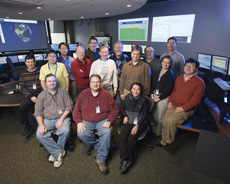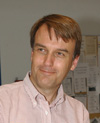|
Wednesday, Feb. 27
Noon
Wellness Works Brown Bag Seminar - One West
Speaker: B. Hatipoglu, MD
Title: Latest Advances in Treatment of Diabetes
3:30 p.m.
DIRECTOR'S COFFEE BREAK - 2nd Flr X-Over
4 p.m.
Fermilab Colloquium - One West
Speaker: D. Archer, University of Chicago
Title: Global Warming in Geologic Time
Thursday, Feb. 28
THERE WILL BE NO PHYSICS AND DETECTOR SEMINAR THIS WEEK
2 p.m.
Computing Techniques Seminar
- FCC1
Speaker: S. Timm, Fermilab
Title: FermiGrid Virtualization and Xen
2:30 p.m.
Theoretical Physics Seminar - Curia II
Speaker: Y. Bai, Fermilab
Title: Minimal Little Higgs Model and Dark Matter
3:30 p.m.
DIRECTOR'S COFFEE BREAK - 2nd Flr X-Over
4:00 p.m.
Accelerator Physics and Technology Seminar - One West
Speakers: Y. Iwashita, Kyoto University
Title: High-Resolution Surface Inspection Camera for Superconducting RF Cavities
Click here for NALCAL,
a weekly calendar with links to additional information. |
Wednesday, Feb. 27
- Vegetable beef
- Fish & chips
- Smart Cuisine: grilled salmon
- Country fried steak w/pepper gravy
- Beef & cheddar panini w/sauteed onions
- Assorted pizza slices
- Cavatappi pasta w/Italian sausage & tomato Ragu
Wilson Hall Cafe Menu |
|
Wednesday, Feb. 27
Lunch
- Wild mushroom strudel
- Salad of field greens w/tomatoes, cucumbers & onion
- Cold lemon soufflé
Thursday, Feb. 28
Dinner
- Sancocho w/pastetobos
- Roast suckling pigs
- Chayote guisado
- Rice & pigeon peas
- Flan & tropical fruit
Chez Leon Menu
Call x4598 to make your reservation. |
|
|
Kaori Maeshima named U.S. CMS Operations Coordinator

In her new role, Kaori Maeshima (front row, far right) will lead
the U.S. CMS Operations Group during the experiment's commissioning phase.
On Jan. 25, the U.S. Compact Muon Solenoid collaboration appointed Fermilab's Kaori Maeshima as its new Operations Coordinator. From remote operations to managing service work, Maeshima will work very closely with the CMS commissioning team to prepare the detector for the first collisions this summer at the Large Hadron Collider at CERN.
"The CMS detector parts have been built in many different places in the world and brought together at Point 5, a position on the LHC ring. Now is the time to learn how to operate CMS as one experiment," Maeshima said.
One of Maeshima's major roles focuses on coordinating the operation of Fermilab's Remote Operations Center with the CMS operations at CERN. The main CMS control room resides at the detector's collision hall at Point 5. Because this is a half-hour drive from the Meynin site, the experiment also has a CMS Centre on the main site. Maeshima, who helped develop Fermilab's Center, emphasized that monitoring tools will have a crucial role.
"When developing a monitoring tool, we made sure that relevant information can be accessed from a remote location from the beginning," she said. "Having location-independent monitoring tools is very important for seamless operations. We will also need a lot of support to make the operation successful. I'm looking forward to working with everyone."
Maeshima speaks from experience because she led the design and operation of the online monitoring system for CDF. In fact, she said, CMS imported some of the monitoring tools that CDF originally developed.
In addition to coordinating remote operations, Maeshima will manage service work, such as detector shifts, for U.S. CMS collaboration members. She also will maintain close communication with Fermilab management. Starting March 3, Fermilab's All Experimenters' Meeting will include an update from U.S. CMS on the first Monday of every month.
-- Elizabeth Clements |
Taking sharper aim at cancer
From Chicago Tribune, Feb. 27, 2008
NIU will build state's first proton-therapy center in West Chicago, but another treatment site is proposed nearby
Northern Illinois University won state permission Tuesday to build a $160 million proton-therapy cancer-treatment center in West Chicago, the first such facility in Illinois, but another is proposed only 6 miles away.
The Illinois Health Facilities Planning Board approved the DeKalb university's ambitious plan to build the 130,000-square-foot cancer-treatment and research center in the DuPage National Technology Park.
Proponents of proton therapy believe it holds tremendous potential to treat cancer with radiation. Besides bringing the treatment to the Chicago area, the project will spur research and development and be an economic boon, NIU officials said.
Read more
|
Energy Under Secretary Orbach discusses impacts of funding shortfalls
From AIP FYI,
Feb. 26, 2008
Under Secretary for Science Raymond Orbach spoke in unambiguous terms at recent meetings of the High Energy Physics Advisory Panel and the Fusion Energy Sciences Advisory Committee. Describing the FY 2008 budget outcome for the high energy physics program as a "slap across the face" for the field and for all of science, and telling the fusion committee that "we are really in trouble," Orbach warned that the large FY 2009 budget request for the Office of Science is a "sitting duck."
Orbach spoke to the High Energy Physics Advisory Panel on February 14, with most of his remarks centering on the FY 2008 budget and the FY 2009 outlook. This year (FY 2008), the program is $93 million short of the Administration's request, and $43 million less than what the program received in FY 2007. Orbach characterized the funding outcome as "a grave setback" and as an "attack" on high energy physics that was the result of deliberate action and not by accident. Describing the essential role of HEP as outlined in the National Academy EPP 2010 report as "a message that was not heard," Orbach said that "Congress picked apart the unity of science" by the under funding of the field. This is, he said, "a major point in the time for the High Energy Physics community."
Orbach called the FY 2009 Office of Science budget request "magnificent", but warned that it could again be a "donor" to short-term demonstration projects in other areas of the DOE budget. "The consequences are extreme if this [HEP] budget is not adopted," he told the committee. The community must change the way it makes it case, Orbach saying that the "entitlement attitude" of scientists that research was "the right thing to do" was one that other interest groups have made in support of other programs, and that it was a failed attitude.
Read more
See all related news stories here
|
|
|
The power of innovation
Jim Strait, head of the Particle Physics Division, wrote today's column.
 |
| Jim Strait |
This year, we find ourselves in dire budgetary straits. While President Bush's request to Congress in FY09 brings the possibility of a better budget, these uncertain times provide a strong reminder that taxpayers need to know why substantial investments in high-energy physics and other areas of basic research are important.
Economists generally agree that R&D and the innovations that follow are key elements of economic growth. To move applied R&D beyond known phenomena, we need basic research that provides a new understanding of nature. But the lengthy time between fundamental discoveries and their practical applications makes the return on basic research investments hard to quantify. It is nearly impossible to guarantee that any particular line of basic research, which by its nature does not have a specific practical goal, will yield any useful applications.
Nevertheless, we can explain to people the historical impact that basic research has had. The transistor, which has had transforming economic and social impact, serves as perhaps the most spectacular return on investment resulting from basic physics research. The transistor would not exist without quantum mechanics, formulated more than 20 years earlier to explain atomic spectra. Physicists first studied these spectramore than 30 years before that.
Can we say what practical results will come from understanding the Higgs mechanism, discovering supersymmetry or learning the nature of dark matter and dark energy? Will they yield the 21st-century equivalent of the transistor? We don't know. But neither Johann Balmer, while studying the spectrum of hydrogen, nor Erwin Schrödinger, while developing the theory of quantum mechanics, could have envisioned the technological and economic transformation that resulted from their work. Econonmic competitiveness requires investment across the spectrum of science from basic research to practical application.
For more information on this topic, I recommend this Industrial Physicist article by Jerome Friedman.
|
ES&H weekly report, Feb. 26
This week's safety report, compiled by the Fermilab ES&H section, includes
two non-recordable, first-aid cases of people slipping on ice hidden below
snow-covered surfaces. The full report is available here.
Safety report archive
|
|
Have a safe day!
FermiGrid classes starting Feb. 26
FermiGrid 201:Scripting and Running Grid Jobs course serves as an introductory course for grid computing.
Learn more and enroll
FermiGrid 202:Grid Storage Access course includes lab time.
Learn more and enroll
FermiGrid 101 Brown Bag seminar to be held on Thursday, March 6, from noon to 1 p.m. in Curia II.
Learn more
Children's Summer Day Camp registration due
Registration forms for the on site day camp for children of Fermilab employees are due by 5 p.m. Feb. 28.
The camp for ages 7 through 12 consists of three separate three-week sessions: session I: June 16 - July 3, session II: July 7- July 25, session III: July 28 - Aug. 15. The camp, held in the lower level of the Kuhn Barn in the village, runs from 7:30 a.m. to 5:30 p.m. You may choose any or all of the sessions. The fee for each day camp session is $295 per camper. A $125 deposit per session per camper must accompany the registration form. Registrations will be accepted at the Recreation Office, M.S. 126. Applications go into a lottery held on Feb. 29. An information booklet and registration form can be found on the Recreation Website.
Apple Leopard presentation March 4
A presentation from Apple titled "Leopard for the Scientist" will be held on March 4, from 8-11 a.m. in Wilson Hall One West. The presentation will include the latest UNIX features and demonstrations in Leopard, Leopard tools for writing and optimizing code, Intel compiler and innovative solutions for scientists from Apple, developers and scientists. Apple Open Source's Ernie Prabhakar, Intel's Steve Lionel, and Ron Ustach and Tim White from the Apple Government Team will present. More information
Brown Bag Seminar on diabetes
The Wellness Works committee presents a Brown Bag Seminar on diabetes from noon to 1 p.m. today, Feb. 27, in One West. Betul Hatipoglu, assistant professor of medicine at the University of Illinois Medical Center at Chicago will speak on the latest advances in diabetes. Hatipoglu also serves as the medical director of the Pancreas and Islet Transplantation Program at the university.
Applications due for 2008 CERN-Fermilab Hadron Collider school
Applications for the 2008 CERN-Fermilab Hadron Collider Physics Summer School are due Feb. 29.
The school takes place August 12-22, 2008, at Fermilab, and focuses on training advanced graduate students and young postdocs.
Both theorists and experimentalists should apply.
The list of lectures and lecturers has been posted at the school Web site.
Click here for more information.
Additional Activities
|
|